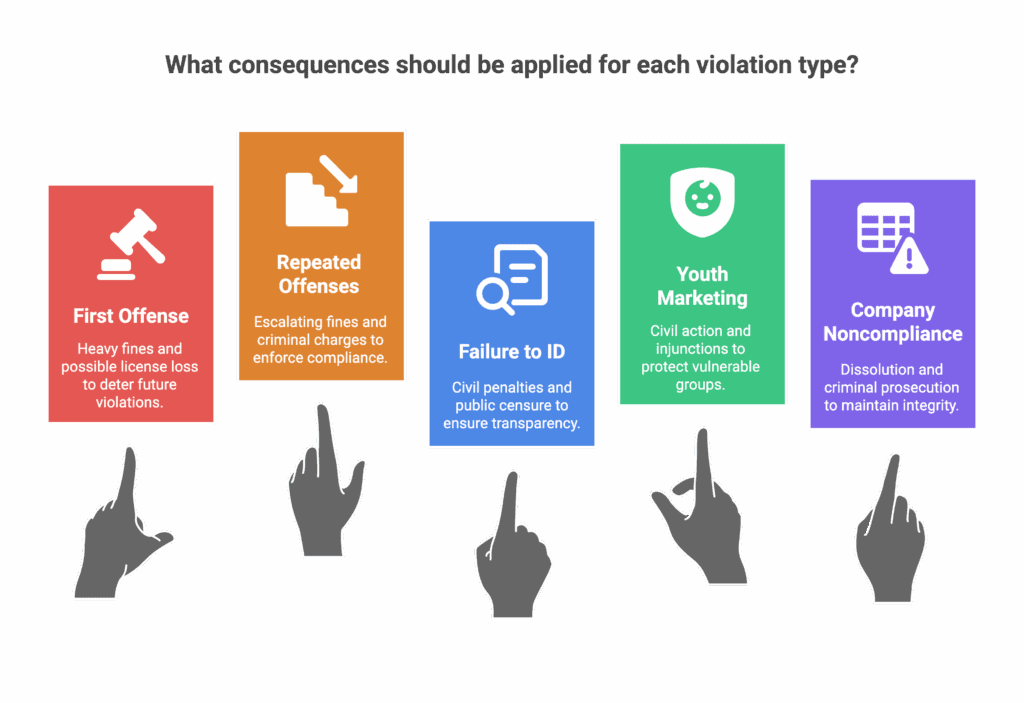Suppose you run a vape shop in Arizona. In that case, the Attorney General’s office is intensifying enforcement—imposing fines of up to $10,000 per violation, threatening business dissolution, and even seeking criminal charges if sales to minors are discovered. This means you could face not only steep civil penalties but also misdemeanor or felony prosecution, putting your business and reputation at risk. Suzuki Law Offices understands the tactics investigators use and can help you learn how to safeguard your business from these aggressive crackdowns.
For experienced legal guidance, consult a Phoenix Criminal Defense Lawyer who can help protect your interests.
Understanding Arizona’s Laws on Selling Tobacco and Vapes to Minors
If you operate a vape shop in Arizona, you’re required to check IDs and refuse sales to anyone under 21.
What happens if you ignore these rules? The state imposes steep penalties for violations, including hefty fines and even the threat of business closure.
Age Verification Requirements
Although selling tobacco and vape products in Arizona might seem straightforward, the state enforces strict age verification laws that every retailer must follow. You’re required to check a valid government-issued photo ID for anyone appearing under 30 before a sale, aligning with Arizona laws on selling tobacco to minors.
Undercover operations, like the “Counter Strike” program, routinely test compliance—failure to verify age can trigger investigations. If you skip these checks, you could face steep penalties for selling nicotine products to minors in Arizona.
Defense attorney for underage vape sales Phoenix professionals stress the importance of sturdy ID protocols to avoid violations. Having a phoenix attorney for vape shop legal defense on standby is wise, but consistent compliance keeps your business and reputation secure within the community.
Penalties for Violations
While Arizona vape shop owners might assume a warning is the typical consequence for selling to minors, the reality is far more severe. The state imposes both civil and criminal penalties for vape sales to minors—fines can reach $10,000 per violation, and even company dissolution is on the table. If you’re targeted in undercover stings, especially in Phoenix, the prosecution’s evidence can be comprehensive, but challenging evidence in underage vape sales cases is possible.
Understanding criminal defense strategies for vape shop owners is essential.
Consider the differences in penalties and responses:
| Violation Type | Potential Consequence |
|---|---|
| First Offense | Heavy fines, possible loss of license |
| Repeated Offenses | Escalating fines, criminal charges |
| Failure to ID | Civil penalties, public censure |
| Youth Marketing | Civil action, injunctions |
| Company Noncompliance | Dissolution, criminal prosecution |

Stay informed and proactive—your community relies on it.
Committed to providing exceptional legal service to each and every client through integrity, compassion and experience.
Get StartedCivil vs. Criminal Penalties for Underage Vape Sales in Phoenix
When you look at Phoenix vape shop enforcement, you’ll notice authorities can pursue both civil and criminal penalties for underage sales.
Civil lawsuits, like those filed by Attorney General Mayes, can result in hefty fines or even the shutting down of businesses.
But you might wonder if criminal charges could also be in play.
How do these two types of penalties compare regarding impact and deterrence for shop owners?
Civil Lawsuit Consequences
Because the Arizona Attorney General’s office has chosen the civil litigation route against Phoenix-area vape shops, the penalties differ considerably from criminal prosecution.
If you’re a business owner, the civil lawsuit consequences under the Arizona AG vape sales crackdown can be severe—think $10,000 fines per violation and even forced dissolution of your company. These aren’t just regulatory slaps on the wrist; they threaten your livelihood and community standing.
However, civil actions also mean you retain certain business owner rights in underage tobacco sale cases, such as the ability to defend against allegations, challenge evidence, and negotiate settlements.
Consulting a Phoenix criminal defense lawyer for vape sales charges—even in civil proceedings—can help you assert your rights and steer through the intricate legal landscape shaped by these aggressive enforcement actions.
Criminal Liability Risks
Although the Arizona Attorney General’s current crackdown relies on civil lawsuits, you shouldn’t overlook the real possibility of criminal liability for underage vape sales in Phoenix. Civil penalties may grab headlines, but Arizona law also makes tobacco sales to minors a criminal offense.
If your shop racks up Arizona vape shop violations, you could face misdemeanor or even felony charges—especially for repeated or willful violations. Have you considered the difference between civil fines and criminal records? It’s imperative to understand the stakes:
- Criminal liability can mean jail time, not just fines.
- Convictions may permanently damage your reputation and business future.
- Legal defense for tobacco charges becomes indispensable if the state pursues criminal prosecution.
Staying compliant isn’t just smart—it’s essential for your community and your livelihood.
How a Phoenix Criminal Defense Lawyer Can Protect Your Rights
Facing civil lawsuits and aggressive enforcement actions under Arizona’s tobacco laws, you might wonder how a skilled Phoenix criminal defense lawyer can safeguard your rights and interests. If you’re accused of selling tobacco products to minors, the stakes are high—fines, potential business dissolution, and even criminal exposure.
An experienced Phoenix criminal defense lawyer for tobacco-related charges reviews the facts, challenges evidence gathered during undercover stings, and ensures your side is heard. They know how to fight charges for selling to a minor in Arizona by examining whether ID checks were conducted correctly and if law enforcement followed appropriate protocols.
A skilled Phoenix criminal defense attorney challenges sting evidence and scrutinizes law enforcement procedures when facing tobacco-related charges.
A criminal lawyer for tobacco sales to minors in Arizona offers strategic Phoenix legal defense for vape shop violations, protecting your business and personal reputation. By analyzing the enforcement process and your compliance efforts, your attorney can help you chart these intricate proceedings, reduce penalties, and ensure you’re treated fairly under the law.
You’re not alone—expert guidance matters.
Click to contact our personal injury lawyers today
Building a Strong Defense Against Allegations of Selling to Minors in Phoenix
To defend your shop against allegations of selling to minors, you need to show thorough compliance documentation and sturdy staff training protocols.
Are your ID check logs, training records, and policy updates current and accessible for review?
Examining these measures can reveal whether you’ve taken all reasonable steps to prevent underage sales.
Compliance Documentation Strategies
When regulatory scrutiny intensifies, maintaining thorough compliance documentation becomes vital for vape shop operators intent on defending against allegations of selling to minors.
In light of the Arizona AG vape sales crackdown, you need sturdy, organized records to demonstrate your commitment to lawful operations. Ask yourself: Are your transaction records and ID checks readily accessible if enforcement visits? Are your compliance policies documented, updated, and reviewed regularly? Proper documentation not only supports your defense but signals your dedication to the community’s standards.
Consider these essential strategies:
- Document every ID check and sale, storing records securely.
- Regularly update written compliance protocols and keep signed staff acknowledgments.
- Retain logs of inspections and any corrective actions taken.
These strategies provide defensible evidence—necessary if you ever need legal help.
Staff Training Protocols
Although sturdy compliance documentation forms a crucial foundation, your staff’s training ultimately determines whether those protocols succeed in practice. Have you examined how often your team refreshes their knowledge of ID verification, Arizona’s tobacco laws, and your store’s refusal techniques?
It’s not enough to hand out policy binders—consistent, scenario-based training builds absolute vigilance. Do your employees know the subtle tricks undercover youth volunteers use, or how to respond under pressure?
High failure rates, like those seen at New York Smoke Shop and Pro Source, often signal weak training rather than intent. When you create a culture where every staff member feels responsible for compliance, you don’t just protect your business—you join a community committed to safeguarding Arizona’s youth and your industry’s future.
Complete a Free Case Evaluation form now
Investigating Phoenix Law Enforcement’s Undercover Operations
How do Arizona authorities catch vape shops selling to minors? They rely on the “Counter Strike” youth enforcement initiative, a program designed to expose retailers that ignore the law. You’ll see volunteers aged 16–17 working with law enforcement, attempting to buy vape or tobacco products at targeted shops.
These stings aren’t random; officials analyze complaint data and shop histories to focus resources where violations seem likely.
Authorities target shops for stings based on complaint records and past violations, directing enforcement where illegal sales are most likely.
If you’re a retailer or community member, you should understand these undercover operations’ crucial features:
- Realistic scenarios: Teens attempt purchases with no ID or fake excuses, mirroring actual customer behavior.
- Meticulous documentation: Every encounter is logged, including staff responses and whether warnings or refusals occurred.
- Repeat visits: Authorities revisit shops with past violations to test for continued compliance.
This approach fosters accountability. By systematically investigating retailers, Arizona aims to protect youth and maintain community standards against underage sales.
Challenging Evidence Gathered in the Phoenix “Counter Strike” Compliance Checks
Despite the thoroughness of Arizona’s “Counter Strike” compliance checks, vape shop owners aren’t powerless when it comes to contesting the evidence gathered against them. You can scrutinize every step of the undercover operation—were volunteers properly supervised, did they accurately represent their age, and did law enforcement follow all protocols?
Sometimes, evidence hinges on subtle factors: audio or video recordings can be incomplete, paperwork may contain errors, or procedures might deviate from state guidelines.
You should also question whether the shop’s staff genuinely failed to check ID or if there was confusion during the transaction. Analyzing surveillance footage or receipts can sometimes reveal inconsistencies in the state’s account.
Additionally, you’re entitled to know if compliance testers received any coaching that could influence outcomes. By methodically reviewing the evidence, you help ensure the process remains fair and that your rights—and those of the broader vape retail community—are respected.
Negotiating to Reduce or Dismiss Charges in Vape Sale Cases
When facing civil penalties for alleged illegal vape sales to minors, you have several legal avenues to negotiate for reduced or dismissed charges. Arizona’s aggressive enforcement may seem formidable, but you’re not without options. Prosecutors often consider mitigating factors, and a strategic approach could make a real difference to your case’s outcome.
Ask yourself: did your staff follow proper ID protocols? Was your shop’s compliance training documented? These details matter when negotiating penalties.
Key negotiation strategies include:
- Presenting evidence of rigorous employee training and compliance programs
- Demonstrating prompt corrective actions after violations, such as enhanced age-verification technology
- Arguing procedural flaws in how undercover stings were conducted
You’re part of a business community that values fair treatment and due process. By highlighting your proactive compliance efforts, you can often persuade authorities to reduce fines or dismiss some charges altogether.
It’s vital to analyze every fact and assert your rights in these negotiations.
Protecting Your Business License and Reputation in Phoenix
Although Arizona’s recent crackdown sends a strong message, your business license and reputation remain within your control—if you act decisively. In Phoenix, your standing in the community hinges on strict adherence to ID protocols, compliance with tobacco laws, and transparent operations.
Have you implemented sturdy training for your staff on checking IDs and identifying underage customers? Are your marketing materials free from youth-targeted messaging? These questions matter because the AG’s office is watching for lapses.
Regularly auditing your compliance procedures shows regulators—and your customers—that you prioritize legality and community trust. Posting all required legal warnings and keeping meticulous sales records reinforces your commitment to lawful business practices.
What to Do Immediately If You’re Accused of Selling to a Minor
Even a single accusation of selling to a minor can threaten your business’s future and reputation, so it’s vital to act swiftly and strategically. Immediate action not only sends a message to authorities but also reassures your staff and loyal customers that you take compliance seriously.
A single accusation of selling to a minor can jeopardize your business—swift, strategic action is essential to protect your reputation.
Begin by gathering facts—ask which employee was involved, review surveillance footage, and confirm whether proper ID checks were performed. Don’t ignore the accusation; silence may be interpreted as guilt or indifference by regulators and your community.
To protect your business and reputation, you should:
- Document everything: Maintain detailed records of the incident, employee training, and compliance policies.
- Notify your staff: Ensure everyone understands the seriousness and reviews legal protocols.
- Suspend involved employees: Consider temporary suspension until all facts are clear.
Analytically, you’ll need to question if your current protocols are comprehensive enough. This is the time to show your commitment to legal and ethical standards.
Why Choosing an Experienced Phoenix Criminal Defense Lawyer Matters
When facing steep penalties and aggressive enforcement in Arizona, you need a legal team that knows exactly how these cases unfold.
Why should you consider the Suzuki Law Offices for your defense? Their experience with intricate criminal matters in Phoenix could make a significant difference in how your case is resolved.
Why Choose the Suzuki Law Offices?
When you’re facing aggressive enforcement like Arizona’s recent vape shop crackdown, you need experienced defense attorneys who understand the stakes.
Have you considered how proven legal strategies can make a crucial difference in protecting your rights and business?
With the Suzuki Law Offices, you get a team that’s skilled at handling intricate criminal defense cases in Phoenix.
Experienced Defense Attorneys
Facing allegations of selling tobacco or nicotine products to minors in Arizona can put your business, reputation, and future at risk, especially as state enforcement grows more aggressive. When you need a defense, experience matters.
Ask yourself:
- Who truly understands intricate Arizona tobacco laws?
- Which attorneys have a proven track record facing the AG’s office?
- Can your legal team effectively advocate for your rights and interests within the community?
Proven Legal Strategies
Although Arizona’s crackdown on vape shops has intensified, you still have options to protect your business and reputation. Why choose the Suzuki Law Offices? Their attorneys analyze evidence, challenge undercover tactics, and negotiate with prosecutors.
Have you considered how a tailored defense can make a difference? With experienced legal guidance, you stand a better chance to reduce penalties, preserve your license, and safeguard your future.
Frequently Asked Questions
Can Vape Shops Recover Financially After Being Dissolved by the State?
If your vape shop gets dissolved by the state, you can’t recover financially as that legal entity—it’s shut down, and assets might be liquidated to pay fines.
You’d face major obstacles starting over, especially with a public record.
You might feel isolated, but you’re not alone—others have faced similar challenges.
If you want to stay in business, strict compliance and community support are your best paths forward next time.
How Does Arizona Select Shops for Undercover Compliance Checks?
When you wonder how Arizona selects shops for undercover compliance checks, know that the process isn’t random. Officials analyze prior violations, complaints, and risk factors—like proximity to schools or youth hangouts.
If your shop stands out in these areas or has a history of failed inspections, you’re more likely to get a visit. By staying connected, sharing best practices, and prioritizing compliance, you help create a safer, more responsible retail community for everyone.
Are There Resources for Retraining Vape Shop Staff on Compliance?
If you’re looking to retrain your vape shop staff on compliance, you’ll find several helpful resources. Arizona’s Department of Health Services offers training modules focused on age verification and legal sales practices.
National organizations like We Card also provide certification programs and free materials. You can join industry associations for access to compliance webinars and peer support.
Staying proactive helps you build a responsible team and guarantees your shop remains a trusted part of the community.
What Impact Do These Lawsuits Have on Local Vape Industry Regulations?
You’re witnessing a significant shift in local vape industry regulations because these lawsuits set a stricter tone for enforcement.
You might notice increased inspections, higher penalties, and tighter requirements for age verification.
If you own or work at a shop, you’ll likely feel more pressure to follow compliance protocols closely.
This action also signals to the entire community that protecting youth is a shared responsibility, reinforcing your role in upholding these standards.
How Often Are Arizona’s Tobacco Sales Laws Updated or Changed?
You might wonder how often Arizona updates its tobacco sales laws. Typically, these laws don’t change every year, but you’ll see revisions when there’s increased public concern or federal guidance.
Lawmakers respond to youth vaping trends, public health data, and enforcement gaps. So, if you’re in the industry or community, staying informed and involved helps you adapt quickly.
Your voice matters when policymakers consider changes that impact everyone’s well-being.
Call or text (602) 682-5270 or complete a Free Case Evaluation form




